Byte Sized Rust
Chicago Rust Meetup
January 2020
Steve Hoffman - @bacoboy


Motivation...
Me: Run my code
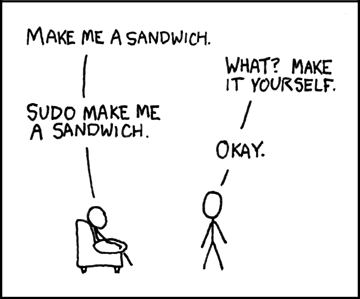
Cloud: Okay
Less Stuff I Gotta Do...
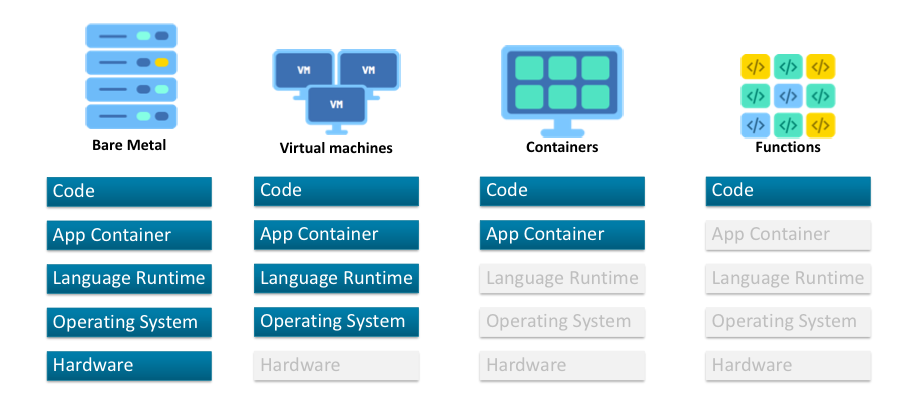
Idle Servers Cost $$$
| Type | vCPU | Mem GB | Hourly on demand | Monthly on demand | Reserved 3yr all upfront |
|---|---|---|---|---|---|
| t3.nano | 2 | 0.5 | $0.0052 | $3.75 | $1.41 |
| t3.small | 2 | 2 | $0.0208 | $14.98 | $5.72 |
| m5.large | 2 | 8 | $0.096 | $69.12 | $26.89 |
| c5.large | 2 | 4 | $0.085 | $61.20 | $23.39 |
| r5.large | 2 | 16 | $0.126 | $90.72 | $36.31 |
| c5n.2xlarge | 8 | 21 | $0.432 | $311.04 | $119.67 |
| c5n.18xlarge | 72 | 192 | $3.888 | $2,799.36 | $896.97 |
Deploying Faster...
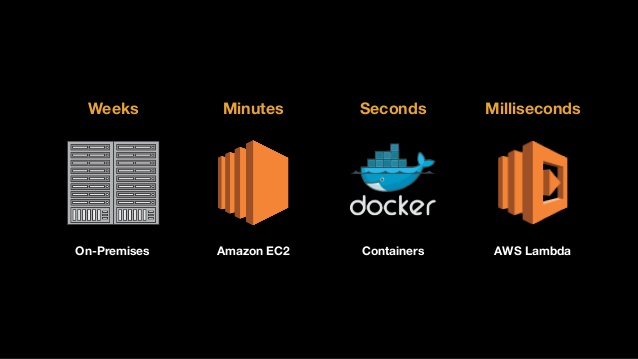
What is a λ?
AWS Says...


A λ is a "handler" function YOU provide
that runs in an AWS container "somewhere"
so you focus on your code not plumbing
Python Handler
def my_handler(event, context):
message = 'Hello {} {}!'.format(event['first_name'],
event['last_name'])
return {
'message' : message
}
Reacts to Events...
(sync like HTTP or async like message on queue)
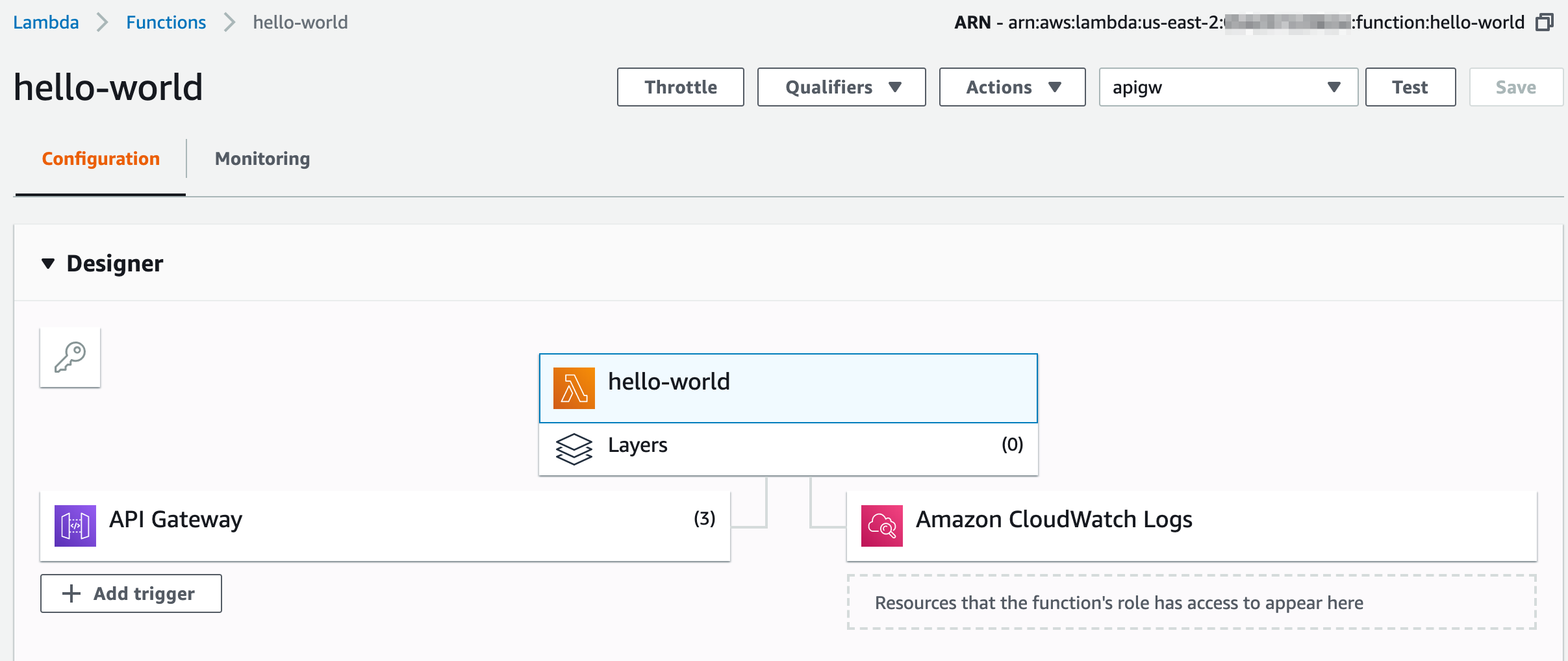
Function
Trigger
Does things to..
All The Clouds Have Them

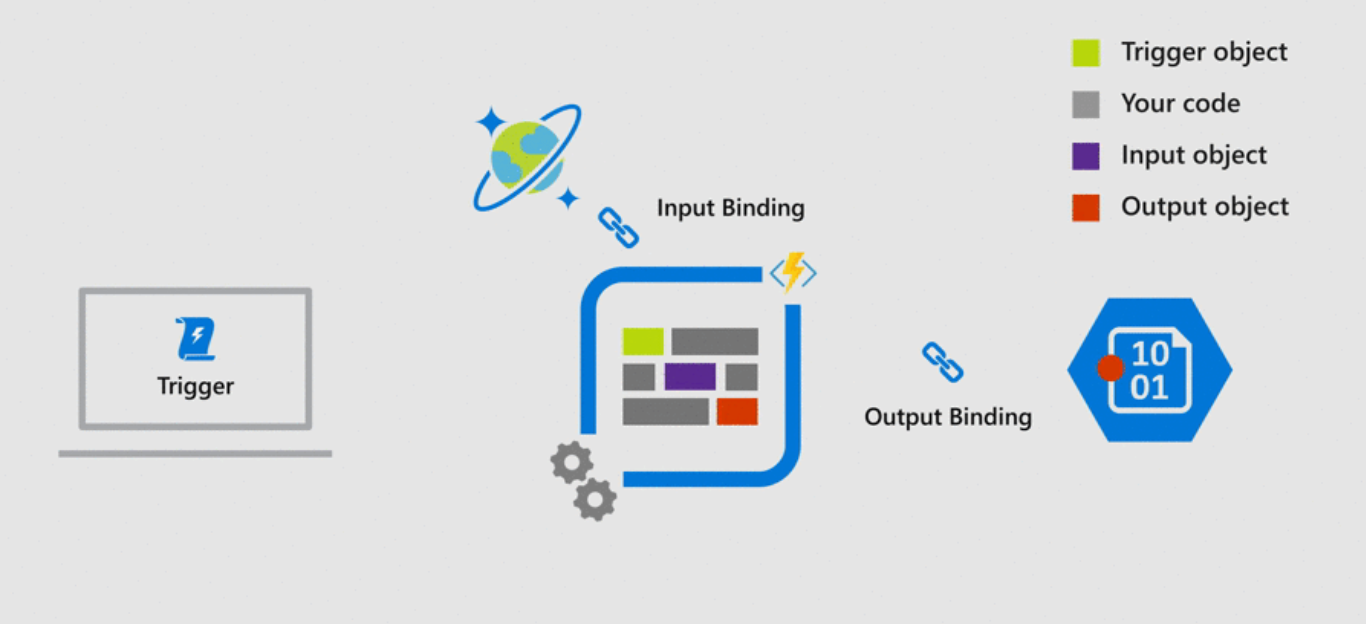


Cheap!
In Theory...
Then $0.0000166667 GB/Second after that...
First million invocations free...
Then $0.20/million after that...
400,000 GB-Seconds free...
Plus
Plus
Other AWS Costs (Databases, Data Transfer...)
Mo RAM Mo $
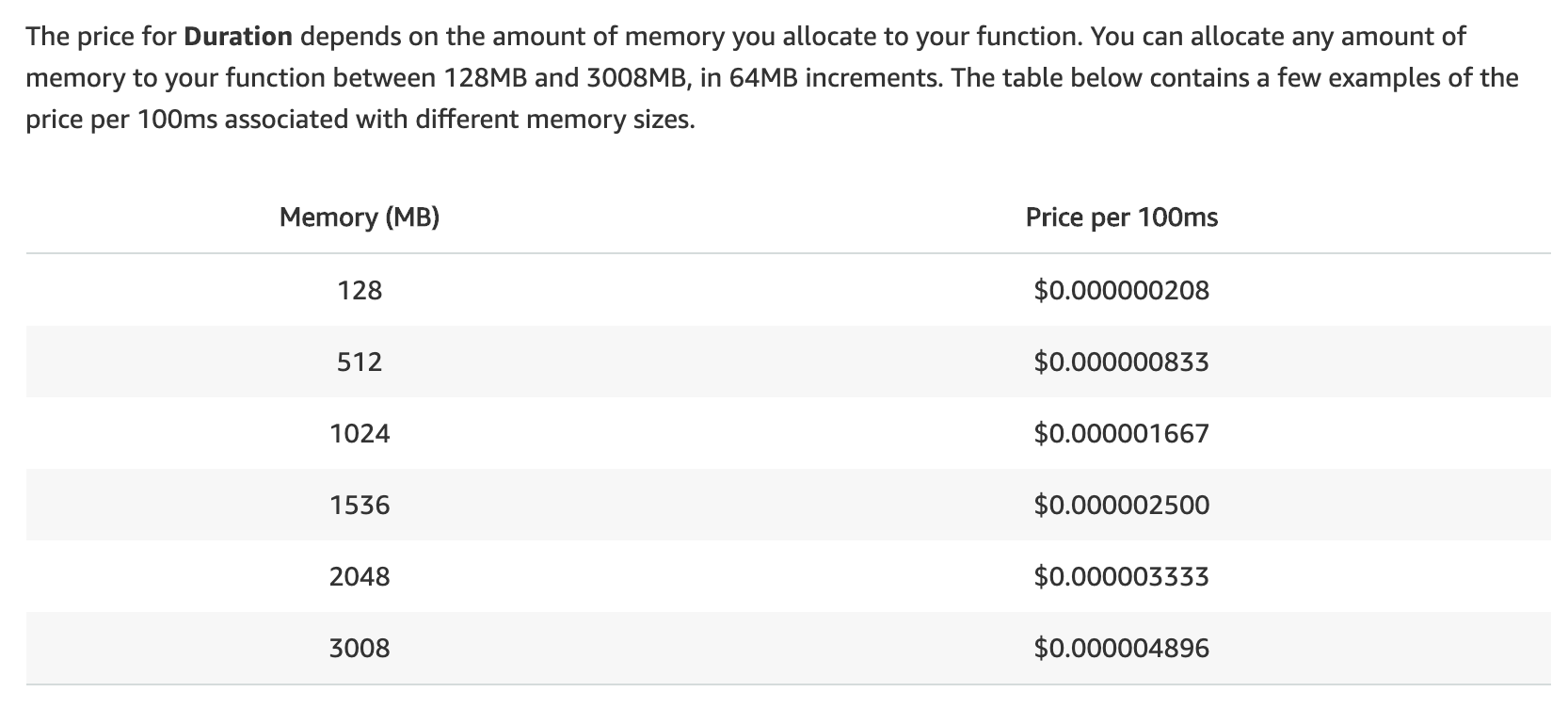
Pricing is "complicated"...


Just Lambda
Lambda + API GW
263 Billiable Line Items Per Region Just for Lambda before you add the "other stuff"
Node Handler
exports.myHandler = function(event, context, callback) {
callback(null, "some success message");
// or
// callback("some error type");
}
Old Hacks
exports.myHandler = function(event, context, callback) {
const execFile = require('child_process').execFile;
execFile('./myprogram', (error, stdout, stderr) => {
if (error) {
callback(error);
}
callback(null, stdout);
});
}First Go apps would use this to run any
Amazon Linux compatible binary/shell script:
Go Handler
type MyEvent struct {
Name string `json:"name"`
}
func HandleRequest(ctx context.Context, name MyEvent) (string, error) {
return fmt.Sprintf("Hello %s!", name.Name ), nil
}
Eventually Go got official support:
Supported Languages

Cold Start
REPORT RequestId: 6f127cc4-c2d7-4422-9490-774092cf5042 Duration: 1.36 ms Billed Duration: 100 ms Memory Size: 128 MB Max Memory Used: 35 MB Init Duration: 28.56 ms REPORT RequestId: 6ad595b5-d679-42e2-b790-ab48811cf9cb Duration: 0.87 ms Billed Duration: 100 ms Memory Size: 128 MB Max Memory Used: 35 MBFirst invocation add Startup Time
Additional runs don't incur overhead


Always logs to Cloudwatch
Each instance gets its own Log Stream in Cloudwatch Logs

Don't be noisy, CWL are $$$$

First Try...
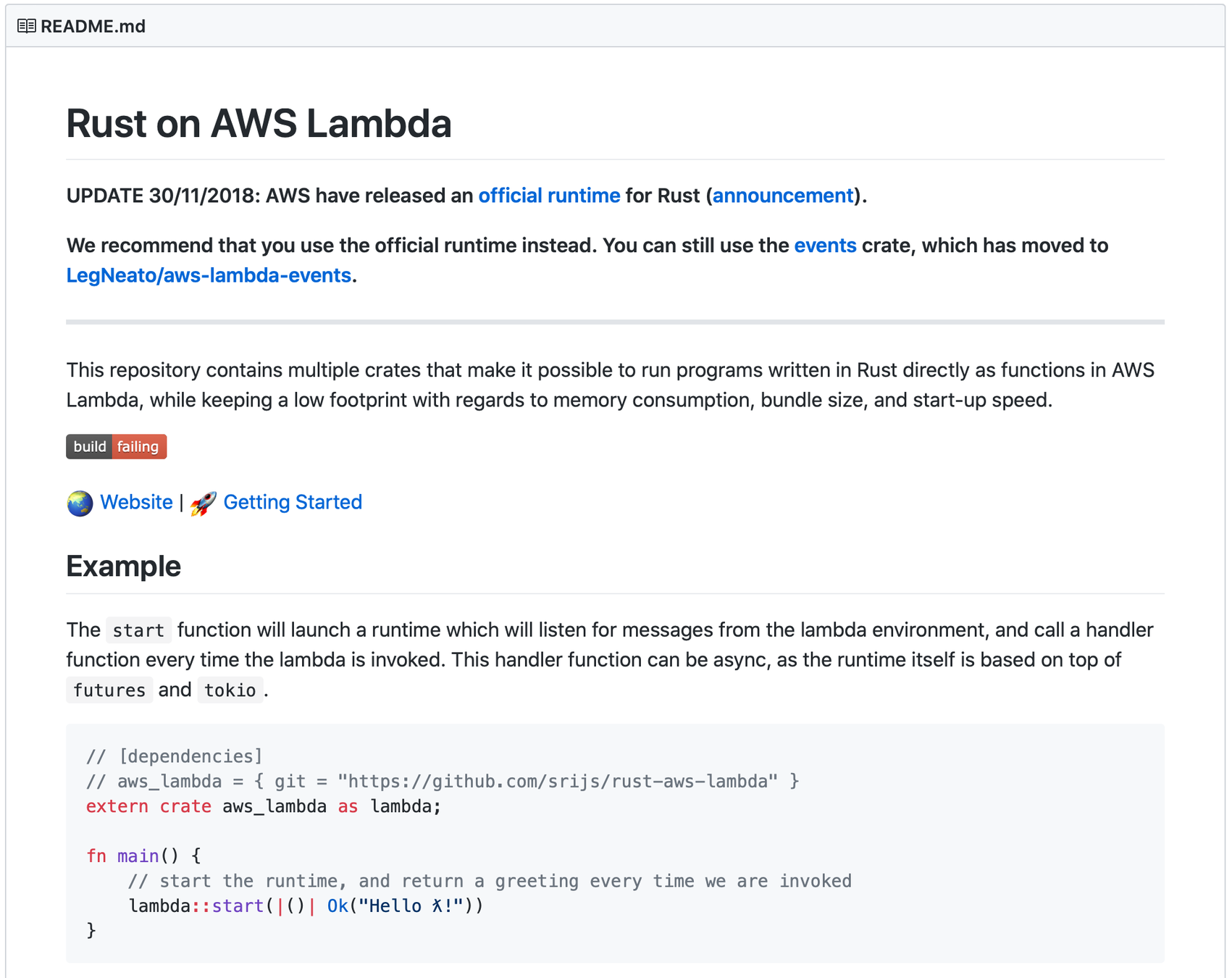
First Rust Lambdas were
pretending to be Go binaries
Became AWS Open Source Project
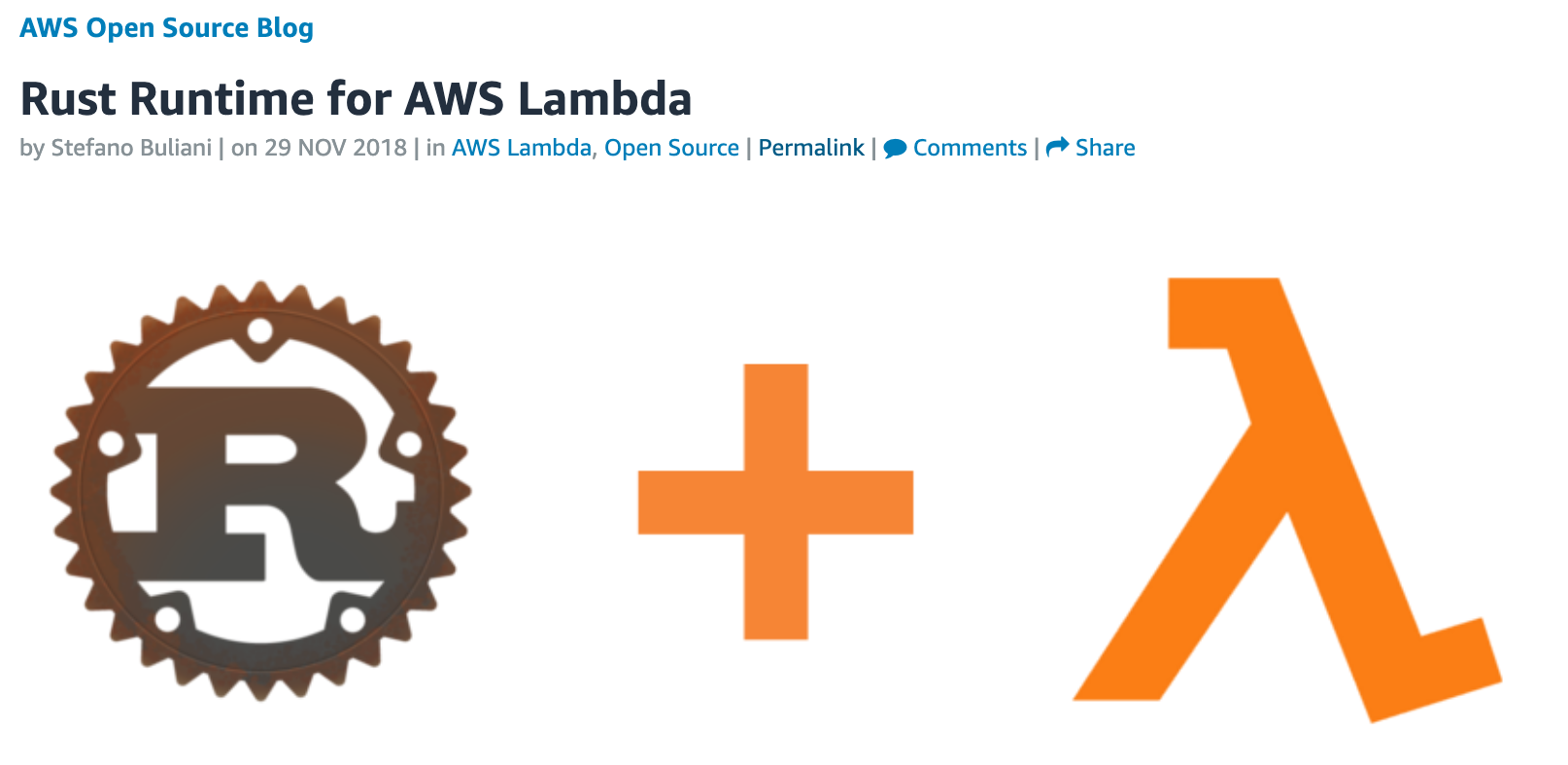
Events Survived...

Building off the Golang SDK
type S3Bucket struct {
Name string `json:"name"`
OwnerIdentity S3UserIdentity `json:"ownerIdentity"`
Arn string `json:"arn"`
}
#[derive(Debug, Clone, PartialEq, Deserialize, Serialize)]
pub struct S3Bucket {
#[serde(deserialize_with = "deserialize_lambda_string")]
#[serde(default)]
pub name: Option<String>,
#[serde(rename = "ownerIdentity")]
pub owner_identity: S3UserIdentity,
#[serde(deserialize_with = "deserialize_lambda_string")]
#[serde(default)]
pub arn: Option<String>,
}


Well Documented AWS APIs and Events
{
"Records": [
{
"eventVersion": "2.1",
"eventSource": "aws:s3",
"awsRegion": "us-east-2",
"eventTime": "2019-09-03T19:37:27.192Z",
"eventName": "ObjectCreated:Put",
"userIdentity": {
"principalId": "AWS:AIDAINPONIXQXHT3IKHL2"
},
"requestParameters": {
"sourceIPAddress": "205.255.255.255"
},
"responseElements": {
"x-amz-request-id": "D82B88E5F771F645",
"x-amz-id-2": "vlR7PnpV2Ce81l0PRw6jlUpck7Jo5ZsQjryTjKlc5aLWGVHPZLj5NeC6qMa0emYBDXOo6QBU0Wo="
},
"s3": {
"s3SchemaVersion": "1.0",
"configurationId": "828aa6fc-f7b5-4305-8584-487c791949c1",
"bucket": {
"name": "lambda-artifacts-deafc19498e3f2df",
"ownerIdentity": {
"principalId": "A3I5XTEXAMAI3E"
},
"arn": "arn:aws:s3:::lambda-artifacts-deafc19498e3f2df"
},
"object": {
"key": "b21b84d653bb07b05b1e6b33684dc11b",
"size": 1305107,
"eTag": "b21b84d653bb07b05b1e6b33684dc11b",
"sequencer": "0C0F6F405D6ED209E1"
}
}
}
]
}
AWS SDK in Rust
extern crate rusoto_core;
extern crate rusoto_dynamodb;
use std::default::Default;
use rusoto_core::Region;
use rusoto_dynamodb::{DynamoDb, DynamoDbClient, ListTablesInput};
fn main() {
let client = DynamoDbClient::new(Region::UsEast1);
let list_tables_input: ListTablesInput = Default::default();
match client.list_tables(list_tables_input).sync() {
Ok(output) => {
match output.table_names {
Some(table_name_list) => {
println!("Tables in database:");
for table_name in table_name_list {
println!("{}", table_name);
}
}
None => println!("No tables in database!"),
}
}
Err(error) => {
println!("Error: {:?}", error);
}
}
}
Client for service specific API
Build the Request
Call the API
Process the response
Sample SQS Event

{
"Records": [
{
"messageId": "19dd0b57-b21e-4ac1-bd88-01bbb068cb78",
"receiptHandle": "MessageReceiptHandle",
"body": "Hello from SQS!",
"attributes": {
"ApproximateReceiveCount": "1",
"SentTimestamp": "1523232000000",
"SenderId": "123456789012",
"ApproximateFirstReceiveTimestamp": "1523232000001"
},
"messageAttributes": {},
"md5OfBody": "7b270e59b47ff90a553787216d55d91d",
"eventSource": "aws:sqs",
"eventSourceARN": "arn:aws:sqs:us-east-1:123456789012:MyQueue",
"awsRegion": "us-east-1"
}
]
}#[derive(Debug, Clone, PartialEq, Deserialize, Serialize)]
pub struct SqsEvent {
#[serde(rename = "Records")]
pub records: Vec<SqsMessage>,
}
#[derive(Debug, Clone, PartialEq, Deserialize, Serialize)]
pub struct SqsMessage {
#[serde(deserialize_with = "deserialize_lambda_string")]
#[serde(default)]
#[serde(rename = "messageId")]
pub message_id: Option<String>,
#[serde(deserialize_with = "deserialize_lambda_string")]
#[serde(default)]
#[serde(rename = "receiptHandle")]
pub receipt_handle: Option<String>,
#[serde(deserialize_with = "deserialize_lambda_string")]
#[serde(default)]
pub body: Option<String>,
#[serde(deserialize_with = "deserialize_lambda_string")]
#[serde(default)]
#[serde(rename = "md5OfBody")]
pub md5_of_body: Option<String>,
#[serde(deserialize_with = "deserialize_lambda_string")]
#[serde(default)]
#[serde(rename = "md5OfMessageAttributes")]
pub md5_of_message_attributes: Option<String>,
#[serde(deserialize_with = "deserialize_lambda_map")]
#[serde(default)]
pub attributes: HashMap<String, String>,
#[serde(deserialize_with = "deserialize_lambda_map")]
#[serde(default)]
#[serde(rename = "messageAttributes")]
pub message_attributes: HashMap<String, SqsMessageAttribute>,
#[serde(deserialize_with = "deserialize_lambda_string")]
#[serde(default)]
#[serde(rename = "eventSourceARN")]
pub event_source_arn: Option<String>,
#[serde(deserialize_with = "deserialize_lambda_string")]
#[serde(default)]
#[serde(rename = "eventSource")]
pub event_source: Option<String>,
#[serde(deserialize_with = "deserialize_lambda_string")]
#[serde(default)]
#[serde(rename = "awsRegion")]
pub aws_region: Option<String>,
}
#[derive(Debug, Clone, PartialEq, Deserialize, Serialize)]
pub struct SqsMessageAttribute {
#[serde(rename = "stringValue")]
pub string_value: Option<String>,
#[serde(rename = "binaryValue")]
pub binary_value: Option<Base64Data>,
#[serde(rename = "stringListValues")]
pub string_list_values: Vec<String>,
#[serde(rename = "binaryListValues")]
pub binary_list_values: Vec<Base64Data>,
#[serde(deserialize_with = "deserialize_lambda_string")]
#[serde(default)]
#[serde(rename = "dataType")]
pub data_type: Option<String>,
}
Even HTTP is an Event
{
"body": "eyJ0ZXN0IjoiYm9keSJ9",
"resource": "/{proxy+}",
"path": "/path/to/resource",
"httpMethod": "POST",
"isBase64Encoded": true,
"queryStringParameters": {
"foo": "bar"
},
"multiValueQueryStringParameters": {
"foo": [
"bar"
]
},
"pathParameters": {
"proxy": "/path/to/resource"
},
"stageVariables": {
"baz": "qux"
},
"headers": {
"Accept": "text/html,application/xhtml+xml,application/xml;q=0.9,image/webp,*/*;q=0.8",
"Accept-Encoding": "gzip, deflate, sdch",
"Accept-Language": "en-US,en;q=0.8",
"Cache-Control": "max-age=0",
"CloudFront-Forwarded-Proto": "https",
"CloudFront-Is-Desktop-Viewer": "true",
"CloudFront-Is-Mobile-Viewer": "false",
"CloudFront-Is-SmartTV-Viewer": "false",
"CloudFront-Is-Tablet-Viewer": "false",
"CloudFront-Viewer-Country": "US",
"Host": "1234567890.execute-api.us-east-1.amazonaws.com",
"Upgrade-Insecure-Requests": "1",
"User-Agent": "Custom User Agent String",
"Via": "1.1 08f323deadbeefa7af34d5feb414ce27.cloudfront.net (CloudFront)",
"X-Amz-Cf-Id": "cDehVQoZnx43VYQb9j2-nvCh-9z396Uhbp027Y2JvkCPNLmGJHqlaA==",
"X-Forwarded-For": "127.0.0.1, 127.0.0.2",
"X-Forwarded-Port": "443",
"X-Forwarded-Proto": "https"
},
"multiValueHeaders": {
"Accept": [
"text/html,application/xhtml+xml,application/xml;q=0.9,image/webp,*/*;q=0.8"
],
"Accept-Encoding": [
"gzip, deflate, sdch"
],
"Accept-Language": [
"en-US,en;q=0.8"
],
"Cache-Control": [
"max-age=0"
],
"CloudFront-Forwarded-Proto": [
"https"
],
"CloudFront-Is-Desktop-Viewer": [
"true"
],
"CloudFront-Is-Mobile-Viewer": [
"false"
],
"CloudFront-Is-SmartTV-Viewer": [
"false"
],
"CloudFront-Is-Tablet-Viewer": [
"false"
],
"CloudFront-Viewer-Country": [
"US"
],
"Host": [
"0123456789.execute-api.us-east-1.amazonaws.com"
],
"Upgrade-Insecure-Requests": [
"1"
],
"User-Agent": [
"Custom User Agent String"
],
"Via": [
"1.1 08f323deadbeefa7af34d5feb414ce27.cloudfront.net (CloudFront)"
],
"X-Amz-Cf-Id": [
"cDehVQoZnx43VYQb9j2-nvCh-9z396Uhbp027Y2JvkCPNLmGJHqlaA=="
],
"X-Forwarded-For": [
"127.0.0.1, 127.0.0.2"
],
"X-Forwarded-Port": [
"443"
],
"X-Forwarded-Proto": [
"https"
]
},
"requestContext": {
"accountId": "123456789012",
"resourceId": "123456",
"stage": "prod",
"requestId": "c6af9ac6-7b61-11e6-9a41-93e8deadbeef",
"requestTime": "09/Apr/2015:12:34:56 +0000",
"requestTimeEpoch": 1428582896000,
"identity": {
"cognitoIdentityPoolId": null,
"accountId": null,
"cognitoIdentityId": null,
"caller": null,
"accessKey": null,
"sourceIp": "127.0.0.1",
"cognitoAuthenticationType": null,
"cognitoAuthenticationProvider": null,
"userArn": null,
"userAgent": "Custom User Agent String",
"user": null
},
"path": "/prod/path/to/resource",
"resourcePath": "/{proxy+}",
"httpMethod": "POST",
"apiId": "1234567890",
"protocol": "HTTP/1.1"
}
}pub struct ApiGatewayProxyRequest {
/// The resource path defined in API Gateway
#[serde(deserialize_with = "deserialize_lambda_string")]
#[serde(default)]
pub resource: Option<String>,
/// The url path for the caller
#[serde(deserialize_with = "deserialize_lambda_string")]
#[serde(default)]
pub path: Option<String>,
#[serde(deserialize_with = "deserialize_lambda_string")]
#[serde(default)]
#[serde(rename = "httpMethod")]
pub http_method: Option<String>,
#[serde(deserialize_with = "deserialize_lambda_map")]
#[serde(default)]
pub headers: HashMap<String, String>,
#[serde(deserialize_with = "deserialize_lambda_map")]
#[serde(default)]
#[serde(rename = "multiValueHeaders")]
pub multi_value_headers: HashMap<String, Vec<String>>,
#[serde(deserialize_with = "deserialize_lambda_map")]
#[serde(default)]
#[serde(rename = "queryStringParameters")]
pub query_string_parameters: HashMap<String, String>,
#[serde(deserialize_with = "deserialize_lambda_map")]
#[serde(default)]
#[serde(rename = "multiValueQueryStringParameters")]
pub multi_value_query_string_parameters: HashMap<String, Vec<String>>,
#[serde(deserialize_with = "deserialize_lambda_map")]
#[serde(default)]
#[serde(rename = "pathParameters")]
pub path_parameters: HashMap<String, String>,
#[serde(deserialize_with = "deserialize_lambda_map")]
#[serde(default)]
#[serde(rename = "stageVariables")]
pub stage_variables: HashMap<String, String>,
#[serde(rename = "requestContext")]
pub request_context: ApiGatewayProxyRequestContext,
#[serde(deserialize_with = "deserialize_lambda_string")]
#[serde(default)]
pub body: Option<String>,
#[serde(rename = "isBase64Encoded")]
pub is_base64_encoded: Option<bool>,
}

Rust Handler
pub trait Handler<E, O> {
fn run(&mut self, event: E, ctx: Context) ->
Result<O, HandlerError>;
}
#[derive(Debug, Clone)]
pub struct HandlerError {
msg: String,
backtrace: Option<backtrace::Backtrace>,
}Digging Deeper - SerDe!
pub type Handler<E, O> = fn(E, Context) -> Result<O, HandlerError>
You implement:
| E | JSON that you want to provide to your Lambda function as input. |
|---|---|
| O | It is the JSON representation of the object returned by the Lambda function. This is present only if the invocation type is RequestResponse. |
Our Hander Function
#[derive(Deserialize, Clone)]
struct CustomEvent {
#[serde(rename = "firstName")]
first_name: String,
}
#[derive(Serialize, Clone)]
struct CustomOutput {
message: String,
}
fn my_handler(e: CustomEvent, c: lambda::Context) -> Result<CustomOutput, HandlerError> {
if e.first_name == "" {
error!("Empty first name in request {}", c.aws_request_id);
return Err(c.new_error("Empty first name"));
}
Ok(CustomOutput {
message: format!("Hello, {}!", e.first_name),
})
}
main starts runtime w/handler
#[macro_use]
extern crate lambda_runtime as lambda;
#[macro_use]
extern crate serde_derive;
#[macro_use]
extern crate log;
extern crate simple_logger;
use lambda::error::HandlerError;
use std::error::Error;
fn main() -> Result<(), Box<dyn Error>> {
simple_logger::init_with_level(log::Level::Info)?;
lambda!(my_handler);
Ok(())
}
Stuff outside handler persists between runs on same lambda instance
(Think reusing connections or other "costly" things)
Cargo Changes
[dependencies]
lambda_runtime = "^0.1"
serde = "^1"
serde_json = "^1"
serde_derive = "^1"
log = "^0.4"
simple_logger = "^1"
[[bin]]
name = "bootstrap"
path = "src/main.rs"Lambdas using "provided" runttimes must be named:
bootstrap
So what can you
build with this?
Synchronous Application
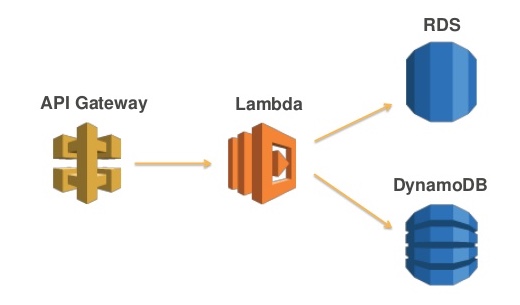
Like a public API or marketing tracking pixel
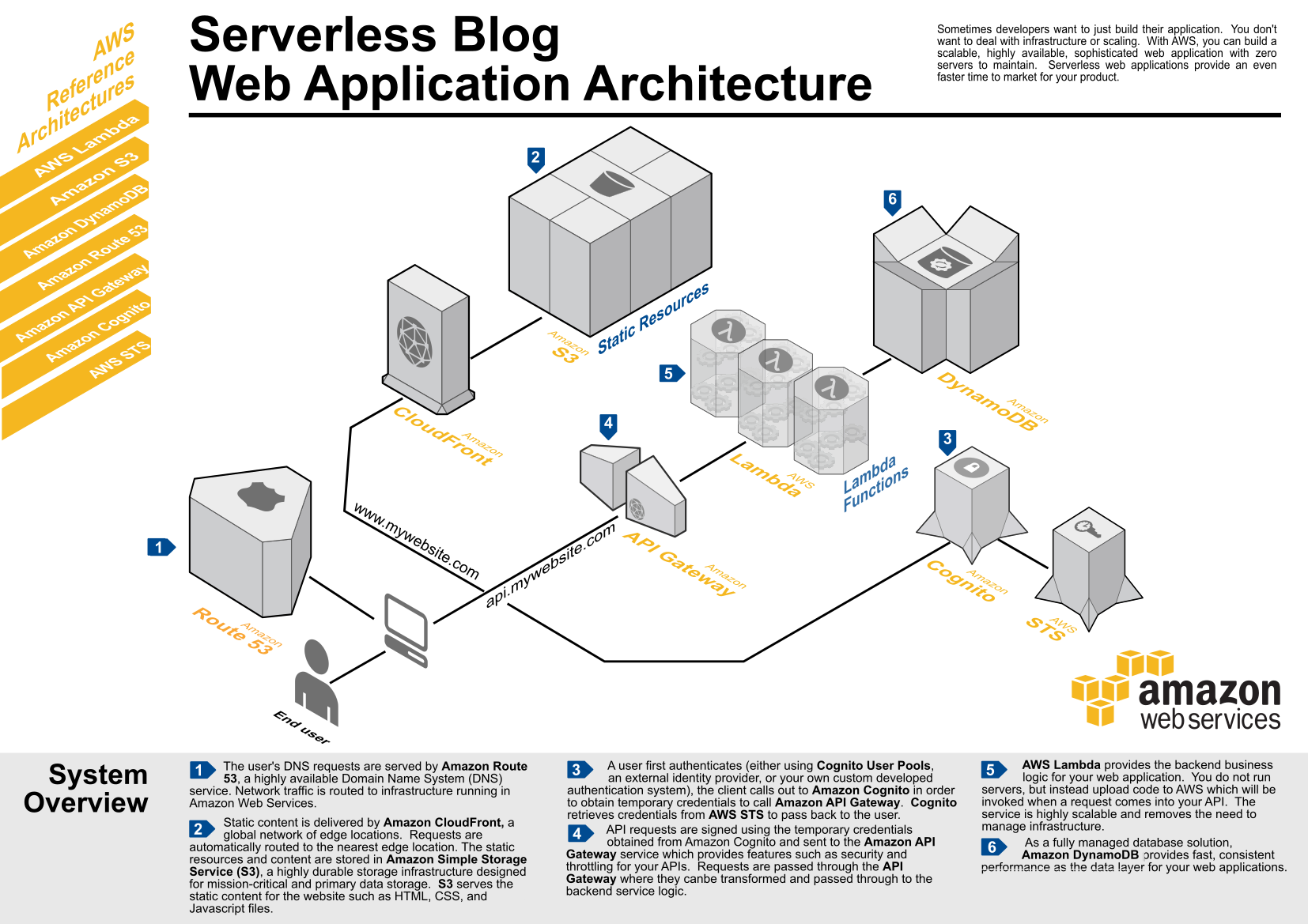
More Complicated Version
Asynchronous File Processing
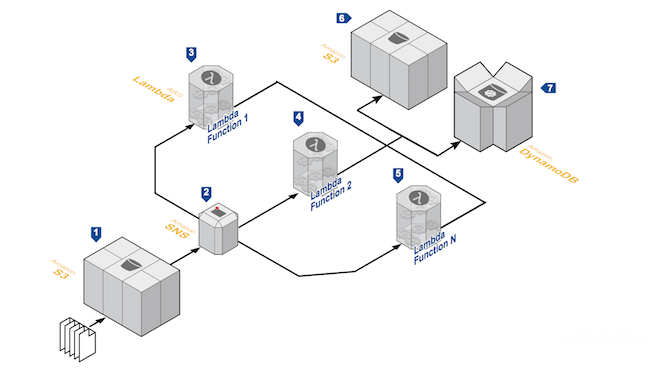
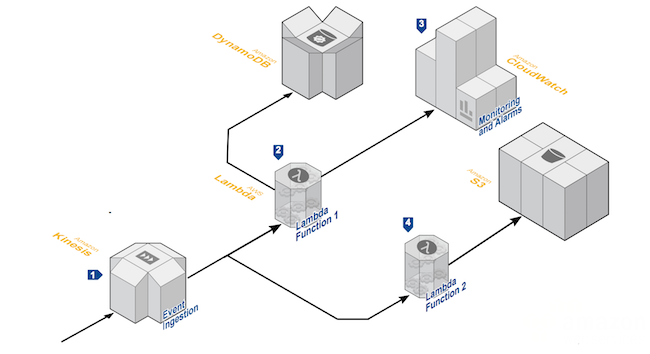
Asynchronous Stream Processing
Manual/SAM/Serverless

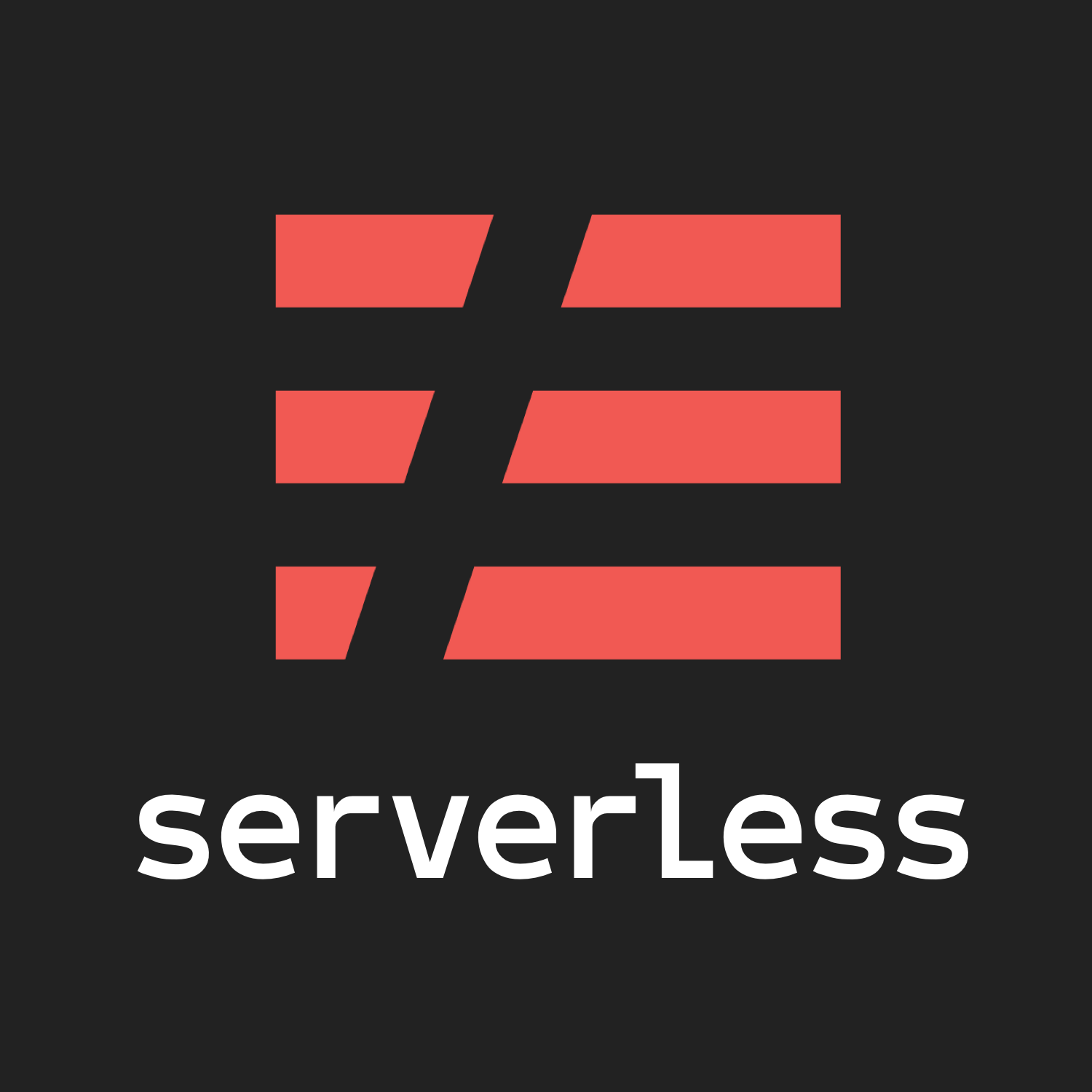
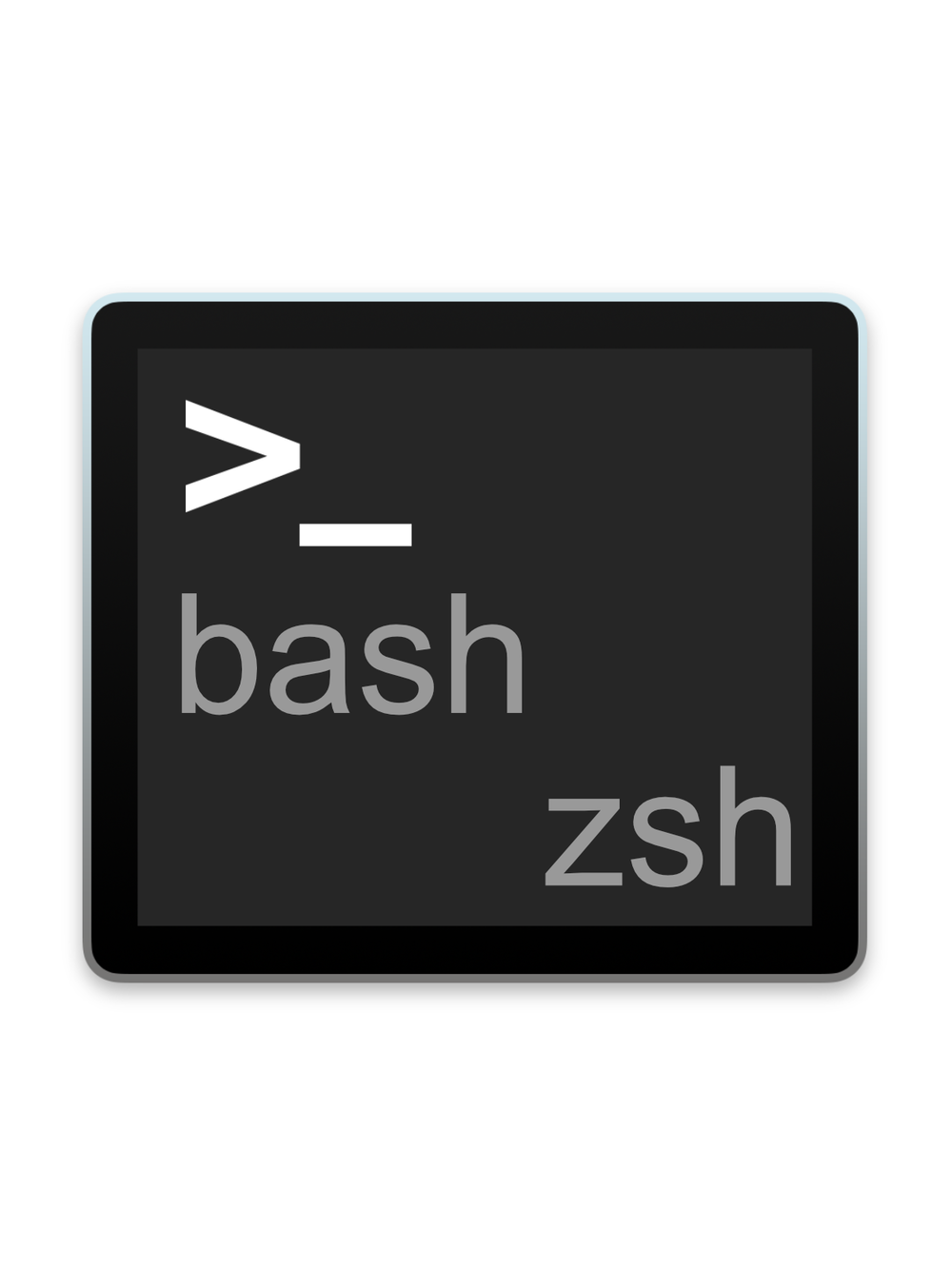
On a Mac cross
compile with Docker
$ docker pull clux/muslrust
$ docker run -v $PWD:/volume --rm -t clux/muslrust cargo build --release
$ zip -j hello-world.zip ./target/x86_64-unknown-linux-musl/release/bootstrapCan be kinda slow...

On a Mac cross
compile directly
$ rustup target add x86_64-unknown-linux-musl
$ brew install filosottile/musl-cross/musl-cross
$ ln -s /usr/local/bin/x86_64-linux-musl-gcc /usr/local/bin/musl-gcc
$ cat .cargo/config
[target.x86_64-unknown-linux-musl]
linker = "x86_64-linux-musl-gcc"
$ cargo build --target=x86_64-unknown-linux-musl --release
$ file target/x86_64-unknown-linux-musl/release/bootstrap
.../bootstrap: ELF 64-bit LSB executable, x86-64, version 1 (SYSV), statically linked, with debug_info, not stripped
$ zip -j hello-world.zip ./target/x86_64-unknown-linux-musl/release/bootstrap^-- Correct!
<-- Takes 30 min - get coffee!

Upload function
with AWS CLI
$ aws lambda create-function \
--function-name hello-world \
--runtime provided \
--zip-file fileb://hello-world.zip \
--handler NOTUSED \
--role arn:aws:iam::123456789012:role/service-role/hello-world
Or deploy with fav tools

resource "aws_lambda_function" "hello-world" {
function_name = "hello-world"
filename = "hello-world.zip"
source_code_hash = "${base64sha256(file("hello-world.zip"))}"
runtime = "provided"
handler = "NOTUSED"
role = aws_iam_role.hello-world.arn
}Manually invoke
$ aws lambda invoke \
--function-name hello-world \
--payload '{"firstName":"Steve"}' response.json
{
"StatusCode": 200,
"ExecutedVersion": "$LATEST"
}
$ cat response.json
{"message":"Hello, Steve!"}
Invoke in AWS Console

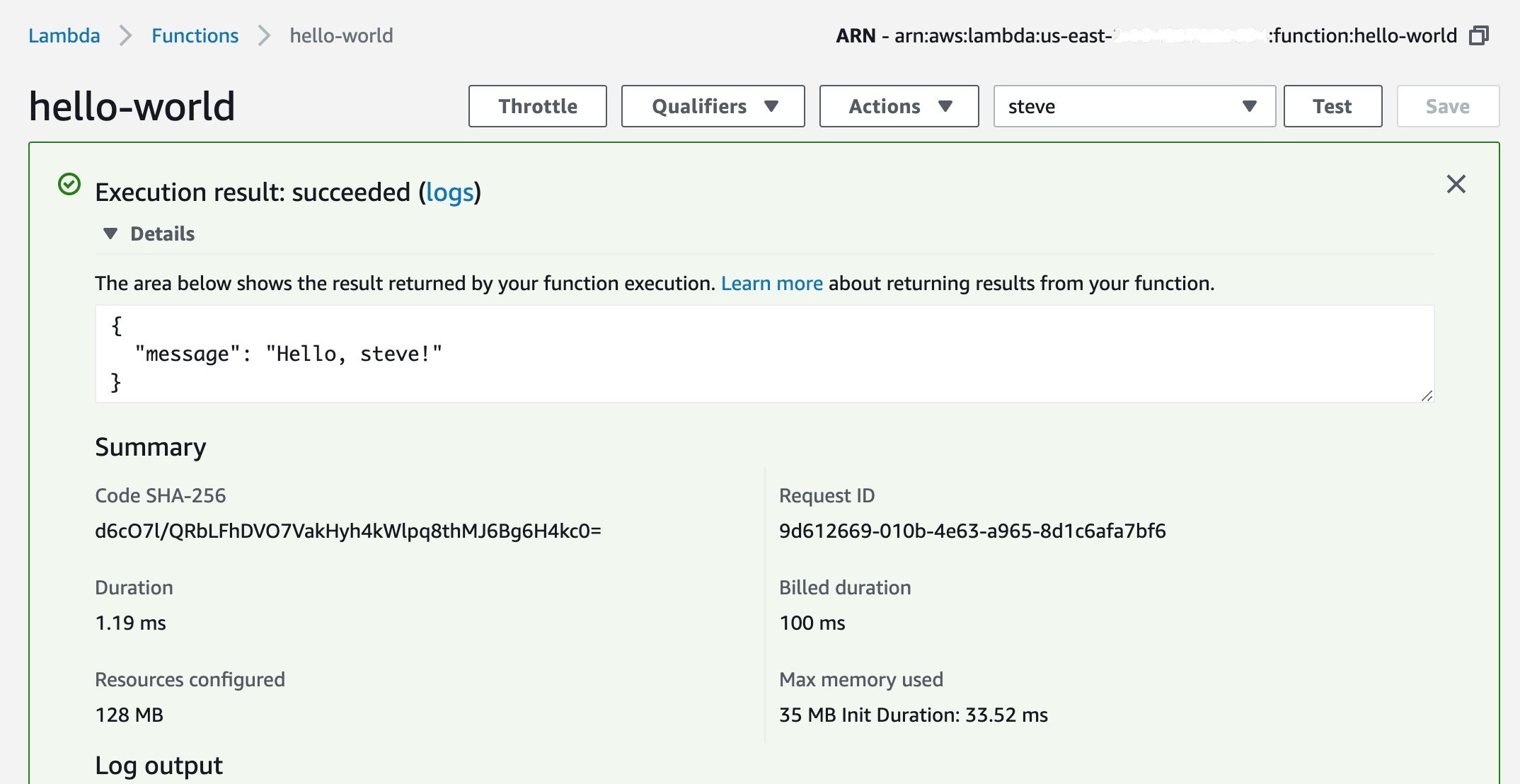
Must Grant Permissions
for Services to invoke
$ aws lambda add-permission \
--function-name hello-world \
--action lambda:InvokeFunction \
--statement-id sqs \
--principal sqs.amazonaws.com
$ aws lambda get-policy --function-name hello-world | jq -r '.Policy' | prettier --stdin --parser json
{
"Version": "2012-10-17",
"Id": "default",
"Statement": [
{
"Sid": "sqs",
"Effect": "Allow",
"Principal": { "Service": "sqs.amazonaws.com" },
"Action": "lambda:InvokeFunction",
"Resource": "arn:aws:lambda:us-east-2:123456789012:function:hello-world"
}
]
}
Default rules are nobody has permissions
to do anything - even AWS Services
Or deploy with fav tools

resource "aws_lambda_permission" "sqs-invokes-hello-world" {
function_name = aws_lambda_function.hello-world.function_name
action = "lambda:InvokeFunction"
statement_id = "sqs"
principal = "sqs.amazonaws.com"
}Serverless Application Model

- Command Line Tools
- Processes YAML-ish files into CloudFormation Templates
- Builds, packages, uploads to s3 for deployment, deploys via CloudFormation
- AWS Only
- Local Execution Environment via Docker
brew tap aws/tap
brew install aws-sam-cliSAM Deploy Templates

AWSTemplateFormatVersion : '2010-09-09'
Transform: AWS::Serverless-2016-10-31
Description: Hello World Function
Resources:
HelloRustFunction:
Type: AWS::Serverless::Function
Properties:
FunctionName: sam-hello-world
Handler: NOTUSED
Runtime: provided
CodeUri: hello-world.zip
Role: arn:aws:iam::123456789012:role/service-role/hello-world
deploy-hello-world.yaml
SAM Packaging/S3

sam package
--template-file deploy-hello-world.yaml \
--s3-bucket chicago-rust-s3 \
--output-template-file cf-deploy-hello-world.yaml
cf-deploy-hello-world.yaml
AWSTemplateFormatVersion: '2010-09-09'
Transform: AWS::Serverless-2016-10-31
Description: Hello World Function
Resources:
HelloWorldFunction:
Type: AWS::Serverless::Function
Properties:
FunctionName: sam-hello-world
Handler: NOTUSED
Runtime: provided
MemorySize: 128
CodeUri: s3://chicago-rust-s3/cebcadfd6fbdd2b1bc570f18ec1b562c
Role: arn:aws:iam::123456789012:role/service-role/hello-worldSAM Deploy Cloudformation

sam deploy \
--template-file cf-deploy-hello-world.yaml \
--stack-name sam-hello-world \
--capabilities CAPABILITY_NAMED_IAM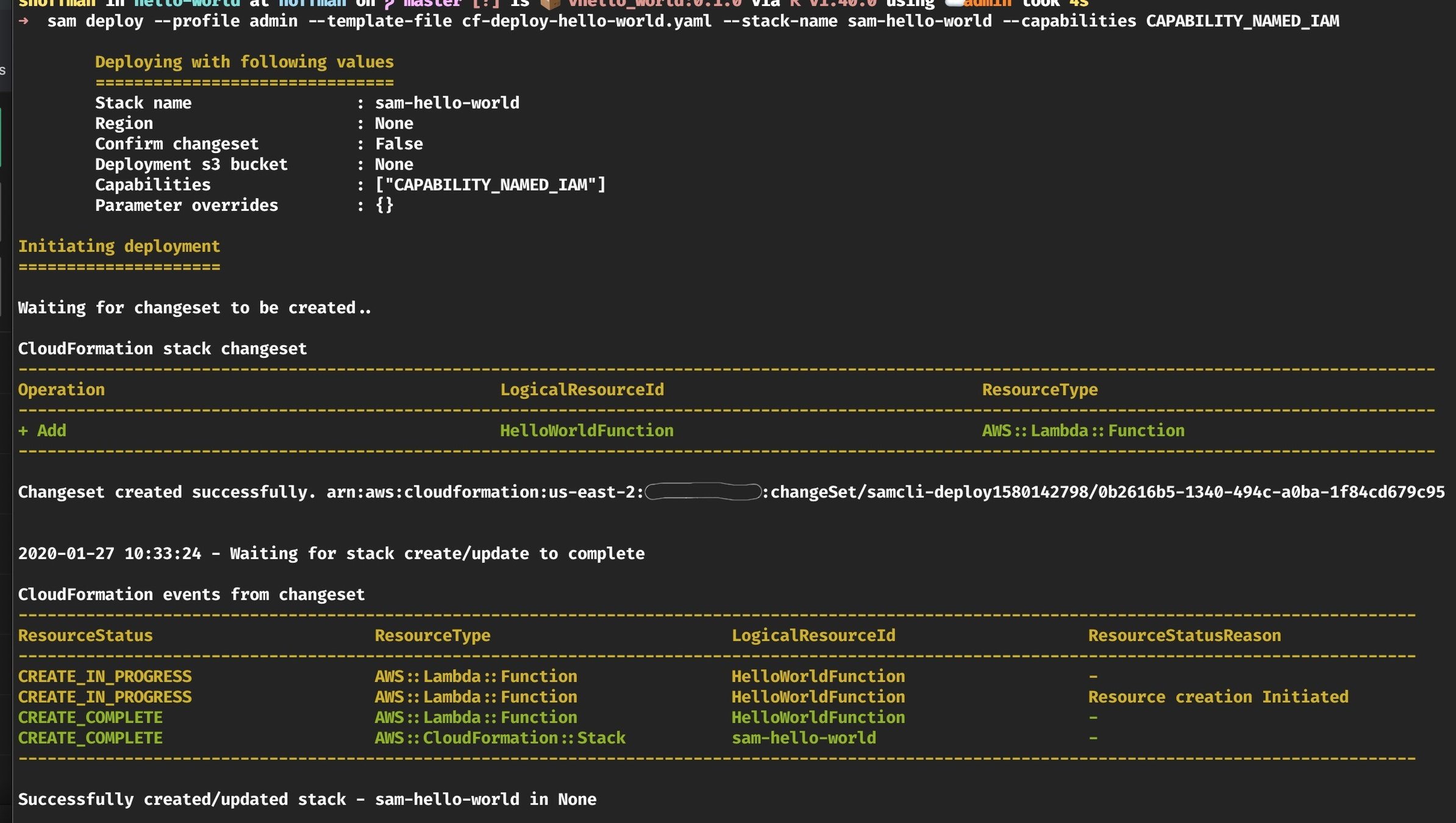
SAM Local Testing

$ sam local generate-event sqs receive-message
{
"Records": [
{
"messageId": "19dd0b57-b21e-4ac1-bd88-01bbb068cb78",
"receiptHandle": "MessageReceiptHandle",
"body": "Hello from SQS!",
"attributes": {
"ApproximateReceiveCount": "1",
"SentTimestamp": "1523232000000",
"SenderId": "123456789012",
"ApproximateFirstReceiveTimestamp": "1523232000001"
},
"messageAttributes": {},
"md5OfBody": "7b270e59b47ff90a553787216d55d91d",
"eventSource": "aws:sqs",
"eventSourceARN": "arn:aws:sqs:us-east-1:123456789012:MyQueue",
"awsRegion": "us-east-1"
}
]
}SAM Local Testing


Uses Docker lambci/lambda:provided container as runtime environment
Using Docker Directly
$ docker run --rm \
-v "$PWD/target/x86_64-unknown-linux-musl/release/":/var/task:ro,delegated \
lambci/lambda:provided \
handler \
'{"firstName": "Steve"}'
START RequestId: a7ac181c-ded5-1b69-5f5e-a7f1f3d30c64 Version: $LATEST
2020-01-27 17:29:55,923 INFO [lambda_runtime::runtime] Received new event with AWS request id: a7ac181c-ded5-1b69-5f5e-a7f1f3d30c64
2020-01-27 17:29:55,924 INFO [lambda_runtime::runtime] Response for a7ac181c-ded5-1b69-5f5e-a7f1f3d30c64 accepted by Runtime API
END RequestId: a7ac181c-ded5-1b69-5f5e-a7f1f3d30c64
REPORT RequestId: a7ac181c-ded5-1b69-5f5e-a7f1f3d30c64 Init Duration: 59.08 ms Duration: 4.01 ms Billed Duration: 100 ms Memory Size: 1536 MB Max Memory Used: 9 MB
{"message":"Hello, Steve!"}Can still use Docker environments to test if using other means of deployment (i.e. terraform, etc)
LocalStack
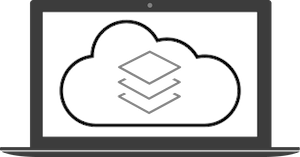
Mock AWS Services for local development
(override API endpoints to point at local Docker containers)
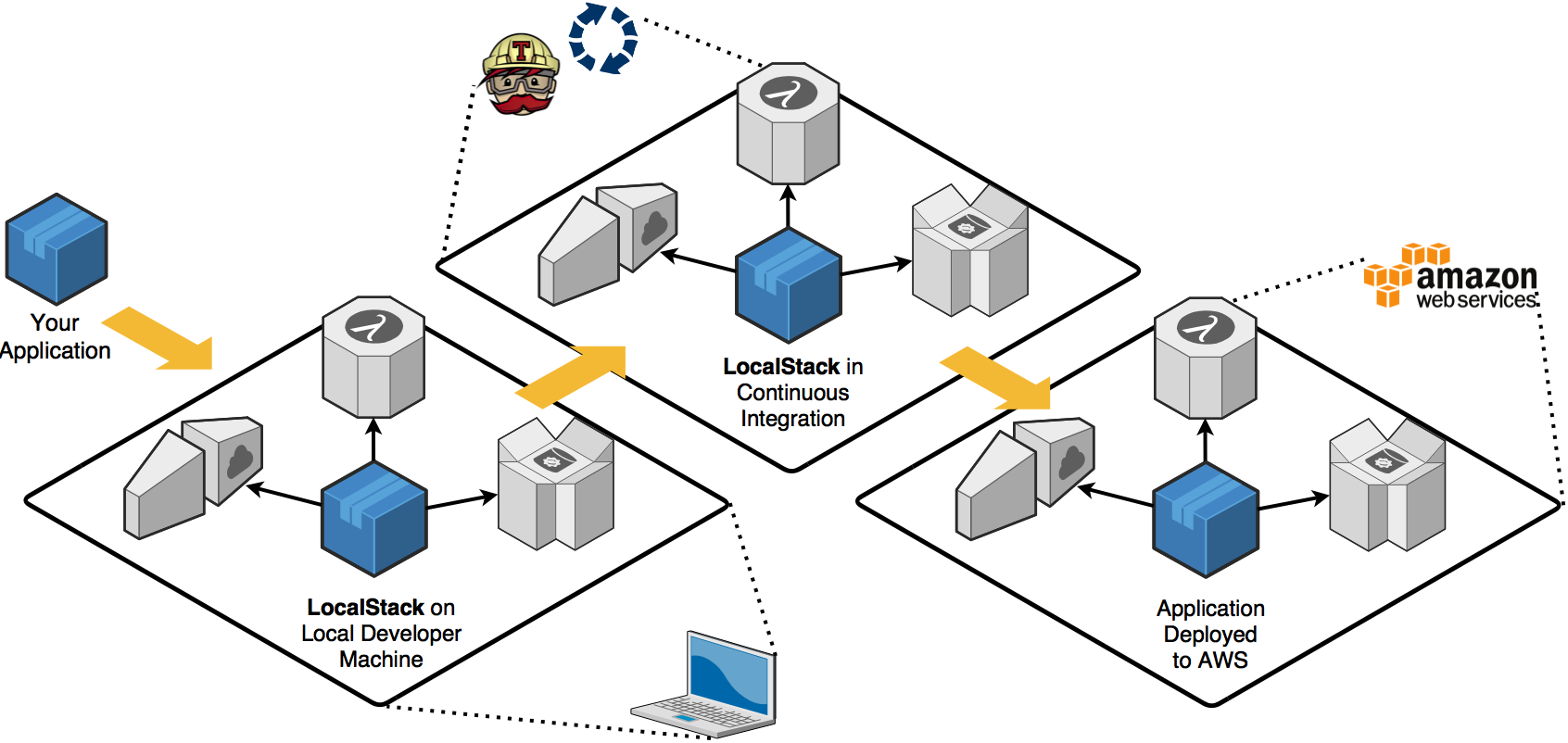
Free and Pro Tiers
(Pro gets more services, tools, and supports a great project)
Can also be used to run your Lambdas
Serverless

- Command Line Tools
- Processes (more) YAML-ish files into CloudFormation Templates - mixed syntax since cf functions can be used
- Builds, packages, uploads to s3 for deployment
- Multi-Cloud Support
- Local Execution Environment via Docker
-
Paid PRO version includes:
- dashboard
- monitoring
- alerts
- ci/cd
- rainbows
- unicorns
Serverless vs SAM

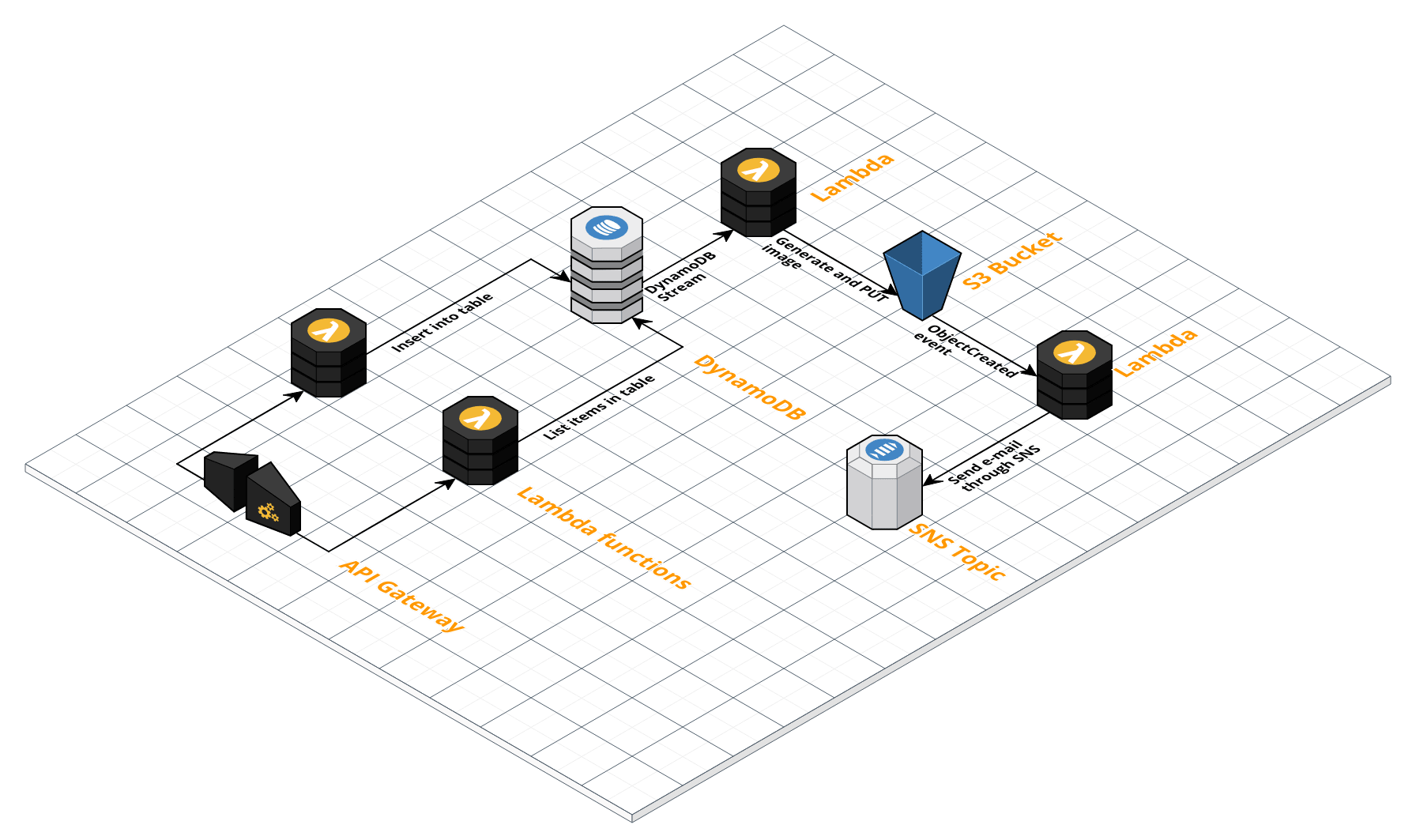


Check out Sander's blog post for great comparison
In the end its all just json/yaml representations
Other Resources To Read/Watch
Step Functions
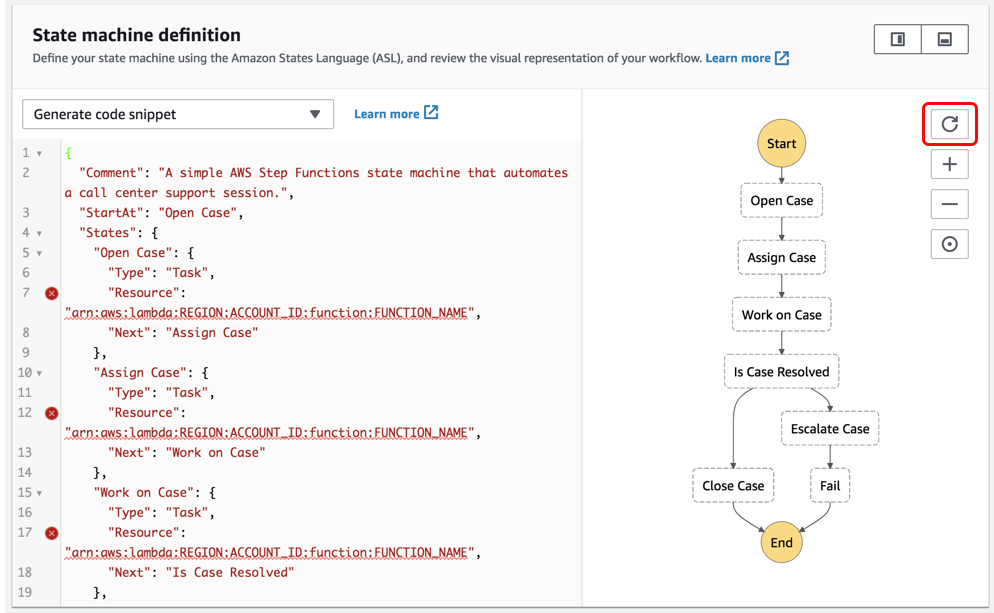
NEW: Lambda Destinations for simple flows
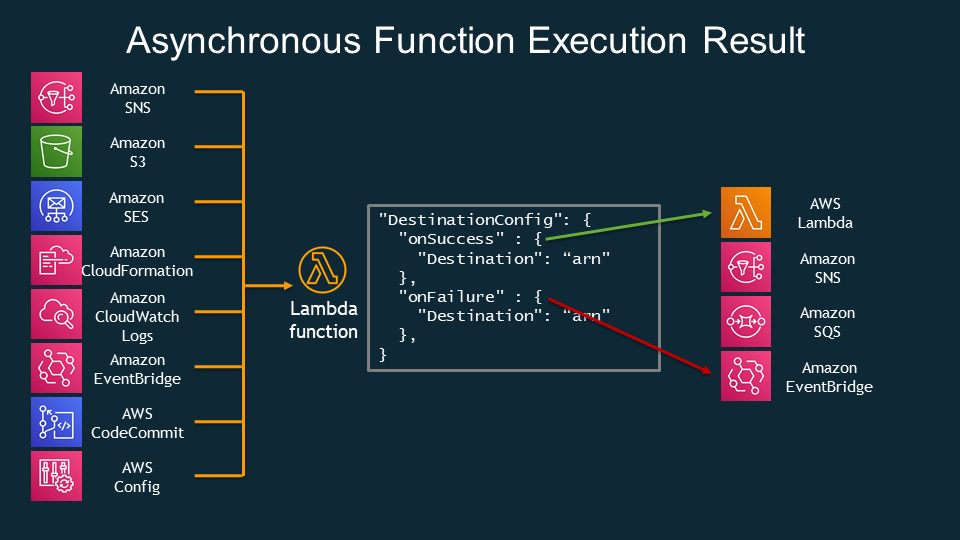
HTTP API Gateway

Cheaper Option
Fewer Dials to Set
v1 vs v2:

AWS XRay Tracing
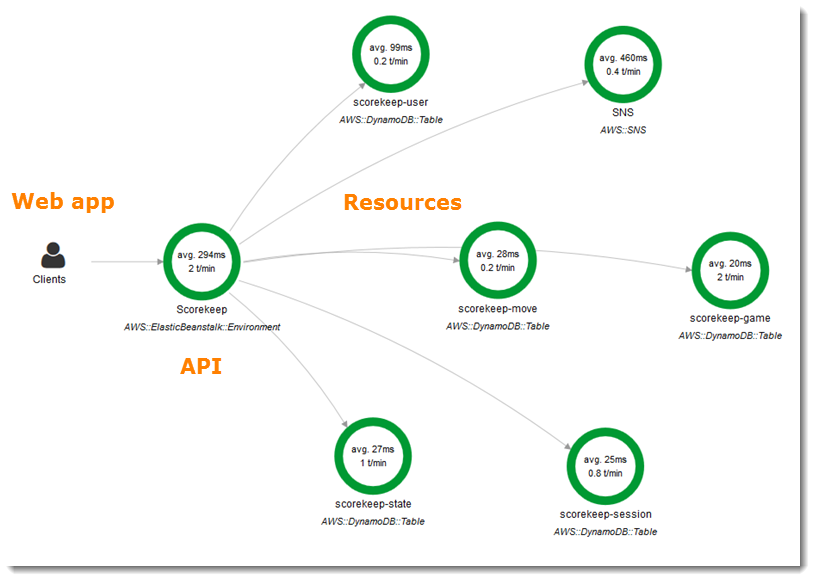

Lots of moving parts!
Know what's going on!
Can configure lambda to have xray - just use the SDK to send data
Or use some non-AWS alternative
(i.e. Espagon)
Map Reduce in λ
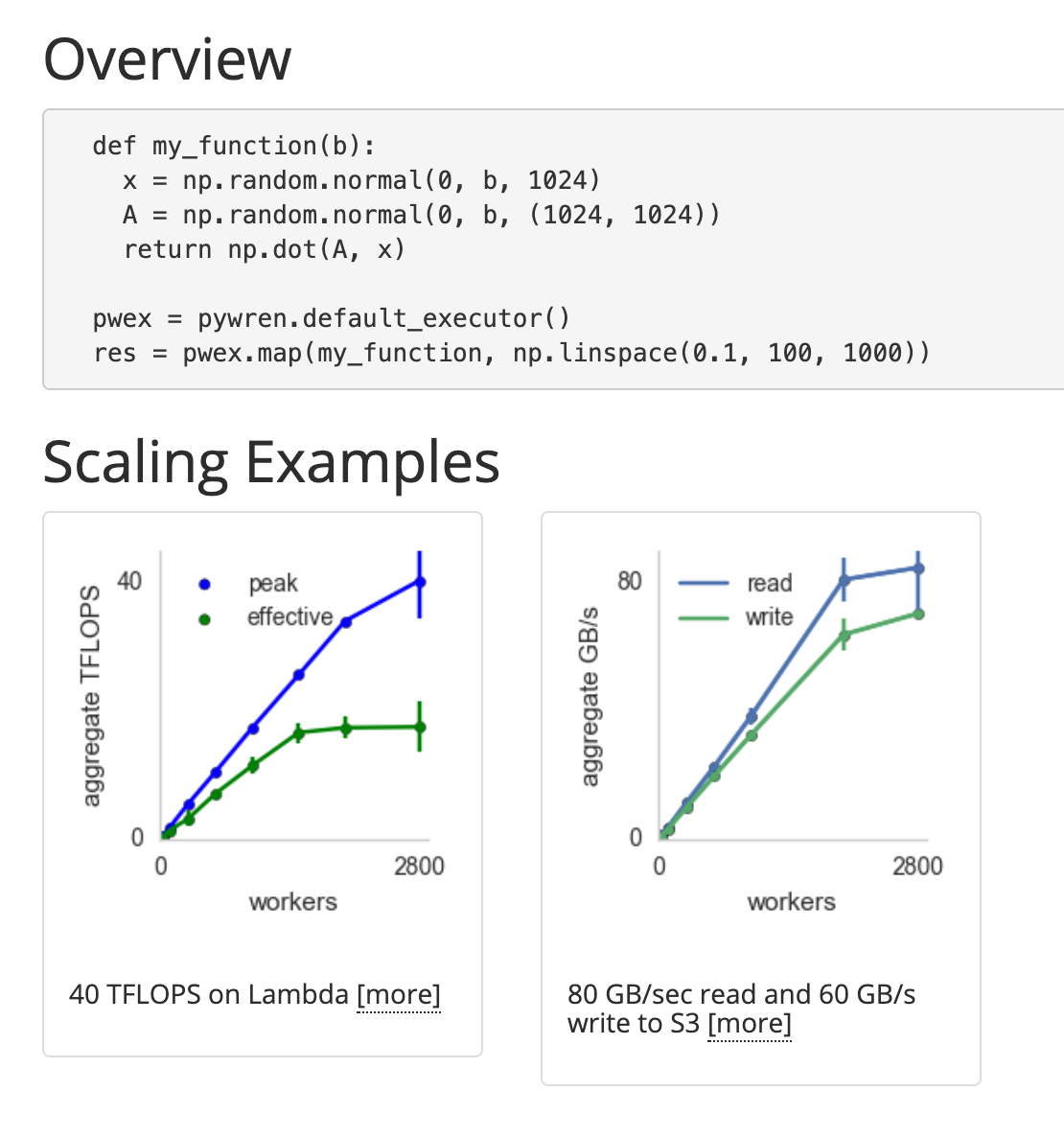
- S3 instead of HDFS
- Lambdas instead of Servers
Big Data with Serverless
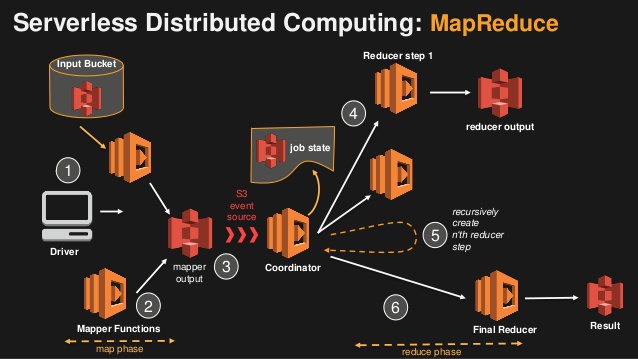
Big Data on a Budget...
|-----------------------|---------|---------|--------------|
| Technology | Scan 1a | Scan 1b | Aggregate 2a |
|-----------------------|---------|---------|--------------|
| Amazon Redshift (HDD) | 2.49 | 2.61 | 25.46 |
|-----------------------|---------|---------|--------------|
| Impala - Disk - 1.2.3 | 12.015 | 12.015 | 113.72 |
|-----------------------|---------|---------|--------------|
| Impala - Mem - 1.2.3 | 2.17 | 3.01 | 84.35 |
|-----------------------|---------|---------|--------------|
| Shark - Disk - 0.8.1 | 6.6 | 7 | 151.4 |
|-----------------------|---------|---------|--------------|
| Shark - Mem - 0.8.1 | 1.7 | 1.8 | 83.7 |
|-----------------------|---------|---------|--------------|
| Hive - 0.12 YARN | 50.49 | 59.93 | 730.62 |
|-----------------------|---------|---------|--------------|
| Tez - 0.2.0 | 28.22 | 36.35 | 377.48 |
|-----------------------|---------|---------|--------------|
| Serverless MapReduce | 39 | 47 | 200 |
|-----------------------|---------|---------|--------------|
Serverless MapReduce Cost:
|---------|---------|--------------|
| Scan 1a | Scan 1b | Aggregate 2a |
|---------|---------|--------------|
| 0.00477 | 0.0055 | 0.1129 |
|---------|---------|--------------|Honeycomb primary storage
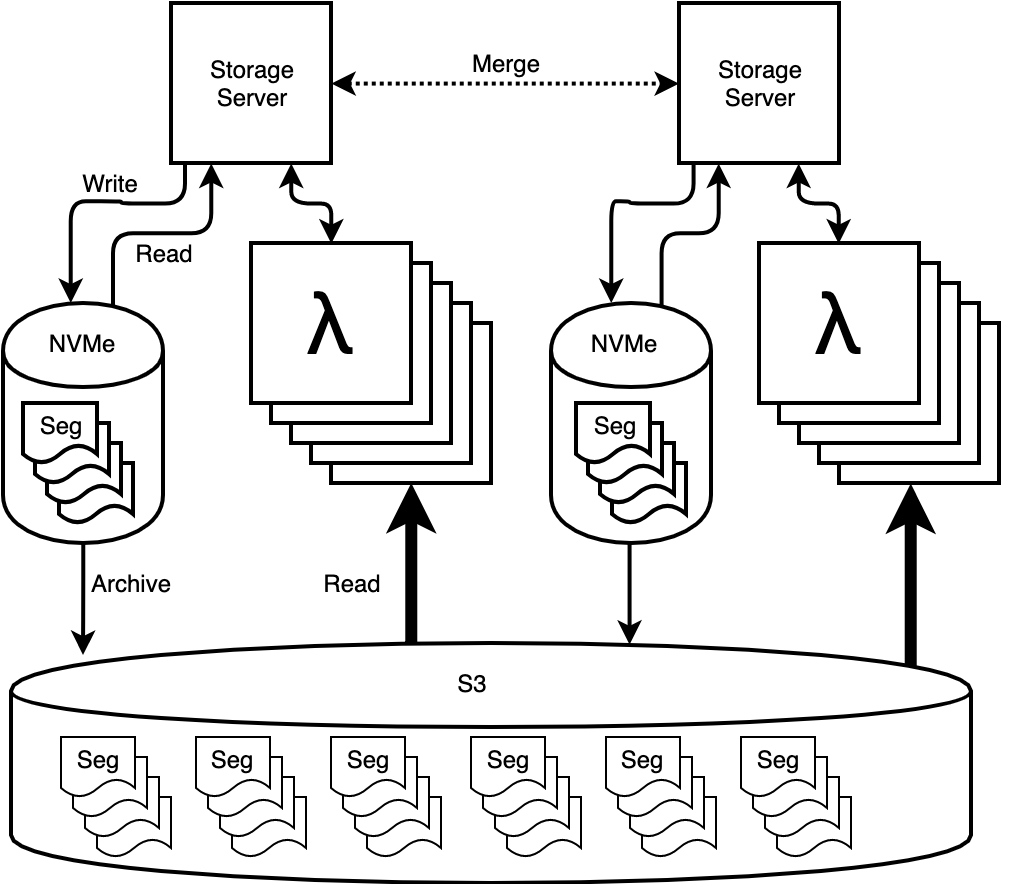
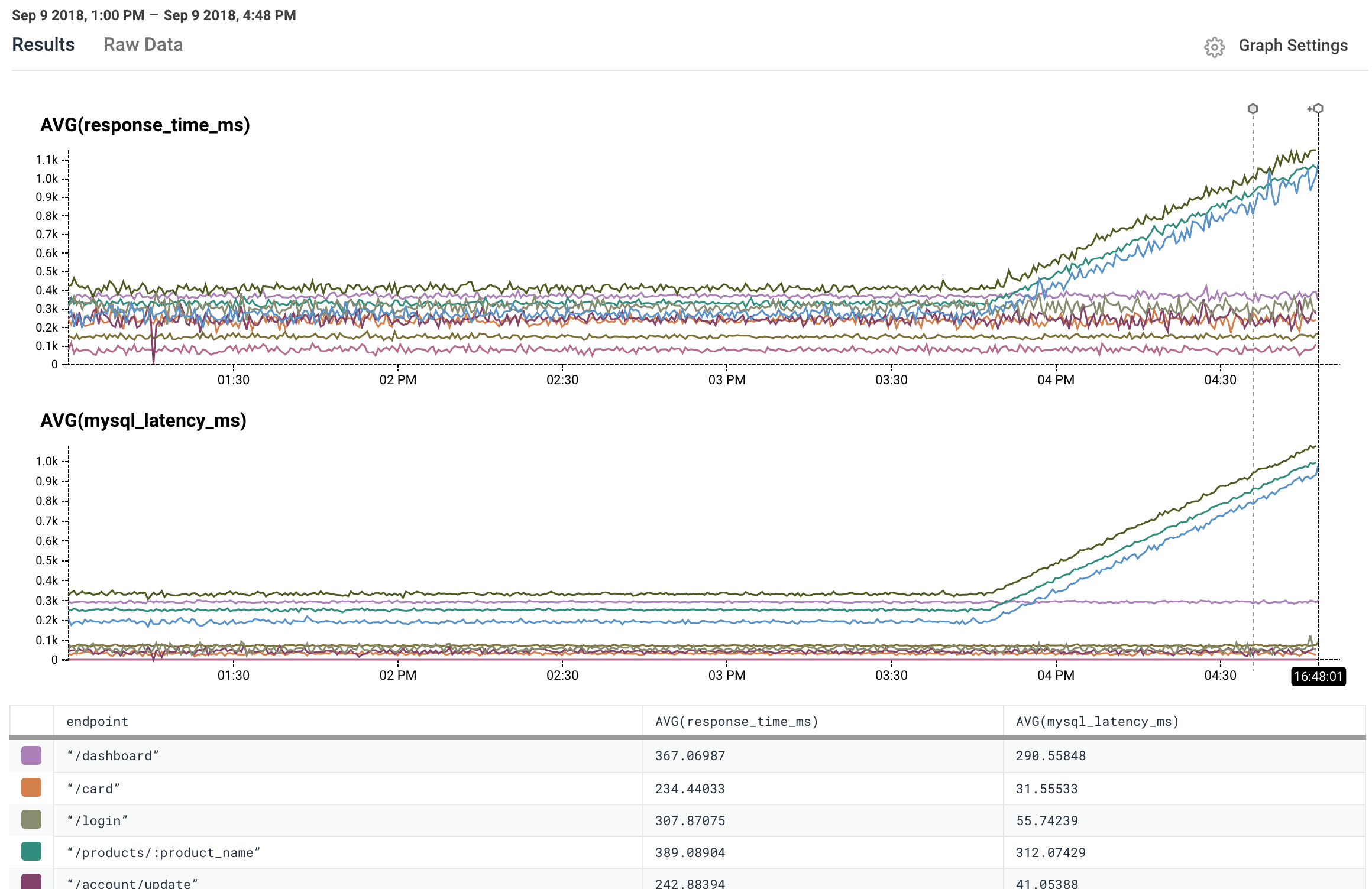
re:Invent 2018 - SRV409
Lambda Deep Dive
More Isn't Always Better
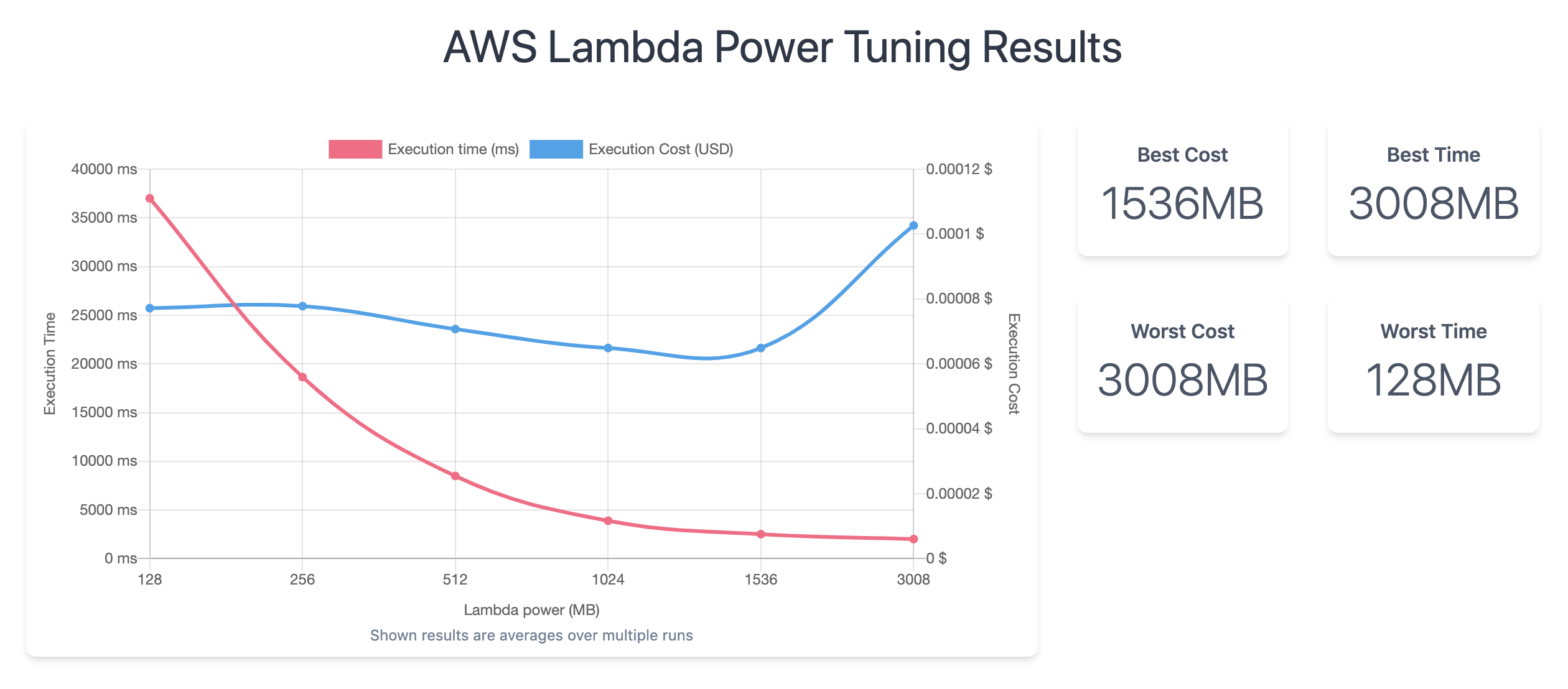
Figure out the best bang for the buck -- don't guess, use data!
And figure out your POST-free-tier costs before you go too far down this path
Google: lambda hidden costs